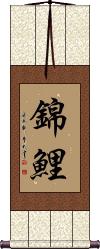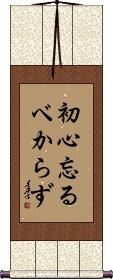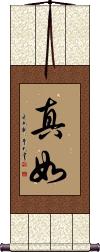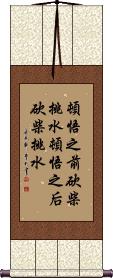Many custom options...
And formats...

Mundane in Chinese / Japanese...
Buy a Mundane calligraphy wall scroll here!
Personalize your custom “Mundane” project by clicking the button next to your favorite “Mundane” title below...
Great Aspirations / Ambition
鴻鵠之誌 is a Chinese proverb that implies that having grand ambitions also means that others will not understand your great expectations and ideas.
Though the actual words come from a longer saying of Confucius, which goes, “The little swallows living under the eaves wouldn't understand the lofty ambitions of a swan (who flies far and wide).”
This Confucius quote has led to this idiomatic expression in China that means “think big.” What you'd be saying is “The lofty ambitions of a swan.”
Note that Chinese people sometimes refer to the little swallow as one who does not “think big” but is, instead, stuck in a rut or just leading a mundane life. Therefore, it's a compliment to be called a swan but not a good thing to be called a swallow.
Koi Fish / Nishiki Goi
If you like or collect and maintain koi fish, 錦鯉 is the wall scroll for you.
Technically, this is a certain and revered species of “koi fish” in Japan, but it is the most normal selection for a wall scroll (more normal than the actual Kanji for “koi” or “fish” alone.
This literally means “brocade carp” or “embroidered carp.” This term is also used to mean the same thing in China (which is the origin of koi fish breeding and cultivation, several generations before they became popular in Japan).
For those of you that don't know, the Kanji for “koi” (which is pronounced “goi” in this entry) really means “carp.” If you want the word that means “koi fish,” it would just be the generic word for “carp fish.” That would include both colorful carp and the more mundane gray carp (the ones people eat if they don't mind lots of bones).
Never Forget Your First Resolution
Never Lose Your Beginner's Spirit
初心忘るべからず is an old Japanese proverb that suggests you try to never forget the enthusiasm you had as a child when you try new things (or even face the day-to-day). Basically, avoid having the mundane attitude that many people get with age.
You'll find this Japanese proverb translated in a few different ways. Here are some of them:
Don't forget your first resolution.
Never forget your childlike enthusiasm.
Forget not the beginner's mind.
Try never to lose your initial enthusiasm (freshness of attitude).
Note: This is sometimes written as 初心忘る可からず. The one shown above is used about 10x more often. There’s only one character difference between the two versions.
Note: Because this selection contains some special Japanese Hiragana characters, it should be written by a Japanese calligrapher.
Tathata / Ultimate Nature of All Things
真如 comes from the Sanskrit and Pali word often romanized as “tathata” or “tathatā.” Originally written, “तथता.”
It's a Buddhist term often translated as “thusness” or “suchness,” but this does not explain it.
A better explanation may be “the ultimate nature of all things” or “ultimate truth.” However, this gives it too strong of a feeling. This concept is sometimes described as being in awe of the simple nature of something - like a blade of grass blowing in the wind or ripples on water. It is what it is supposed to be, these things follow their nature. Amazing in their mundane simplicity.
Every sect of Buddhism will have a slightly different flavor or explanation, so don't get fixated on one definition.
Notes: Sometimes Buddhists use the word dharmatā, a synonym to tathatā.
In Japan, this can also be the female given name Mayuki, or the surname Majo.
Chop Wood, Carry Water
Before enlightenment or after, chores remain.
頓悟之前砍柴挑水; 頓悟之後砍柴挑水 means “Before enlightenment, chop wood, carry water; After enlightenment, chop wood, carry water.
This is a Chinese proverb that is attributed to 吴力 (Wú Lì) who lived between 1632 and 1718 - living part of his life as a devout Buddhist, and many years as a Catholic Jesuit Priest in China - what an interesting life!
This has been explained many times in many ways. I am a Buddhist, and here is my brief take on this proverb...
Before enlightenment, one may find daily chores mundane, tedious, and boring. However, upon reaching enlightenment one is not relieved of the details of daily life. An enlightened person will, however, see such chores as a joy, and do them mindfully.
There is another version floating around, which is 在你領悟之前砍柴、運水。在你領悟之後,砍柴、運水。
If you want this other version, just contact me. The meaning is the same, just different phrasing.
Not the results for mundane that you were looking for?
Below are some entries from our dictionary that may match your mundane search...
| Characters If shown, 2nd row is Simp. Chinese |
Pronunciation Romanization |
Simple Dictionary Definition |
佛 see styles |
fó fo2 fo hotoke ほとけ |
More info & calligraphy: Buddhism / Buddha(surname) Hotoke Buddha, from budh to "be aware of", "conceive", "observe", "wake"; also 佛陀; 浮圖; 浮陀; 浮頭; 浮塔; 勃陀; 勃馱; 沒馱; 母馱; 母陀; 部陀; 休屠. Buddha means "completely conscious, enlightened", and came to mean the enlightener. he Chinese translation is 覺 to perceive, aware, awake; and 智 gnosis, knowledge. There is an Eternal Buddha, see e.g. the Lotus Sutra, cap. 16, and multitudes of Buddhas, but the personality of a Supreme Buddha, an Ādi-Buddha, is not defined. Buddha is in and through all things, and some schools are definitely Pan-Buddhist in the pantheistic sense. In the triratna 三寳 commonly known as 三寳佛, while Śākyamuni Buddha is the first "person" of the Trinity, his Law the second, and the Order the third, all three by some are accounted as manifestations of the All-Buddha. As Śākyamuni, the title indicates him as the last of the line of Buddhas who have appeared in this world, Maitreya is to be the next. As such he is the one who has achieved enlightenment, having discovered the essential evil of existence (some say mundane existence, others all existence), and the way of deliverance from the constant round of reincarnations; this way is through the moral life into nirvana, by means of self-abnegation, the monastic life, and meditation. By this method a Buddha, or enlightened one, himself obtains Supreme Enlightenment, or Omniscience, and according to Māhāyanism leads all beings into the same enlightenment. He sees things not as they seem in their phenomenal but in their noumenal aspects, as they really are. The term is also applied to those who understand the chain of causality (twelve nidānas) and have attained enlightenment surpassing that of the arhat. Four types of the Buddha are referred to: (1) 三藏佛the Buddha of the Tripiṭaka who attained enlightenment on the bare ground under the bodhi-tree; (2) 通佛the Buddha on the deva robe under the bodhi-tree of the seven precious things; (3) 別佛the Buddha on the great precious Lotus throne under the Lotus realm bodhi-tree; and (4) 圓佛the Buddha on the throne of Space in the realm of eternal rest and glory where he is Vairocana. The Hīnayāna only admits the existence of one Buddha at a time; Mahāyāna claims the existence of many Buddhas at one and the same time, as many Buddhas as there are Buddha-universes, which are infinite in number. |
忍 see styles |
rěn ren3 jen nin にん |
More info & calligraphy: Patience / Perseverance(archaism) endurance; forbearance; patience; self-restraint; (given name) Nin kṣānti, 羼提 (or 羼底); patience, endurance, (a) in adverse circumstances, (b) in the religious state. There are groups of two, three, four, five, six, ten, and fourteen, indicating various forms of patience, equanimity, repression, forbearance, endurance, constancy, or "perseverance of the saints," both in mundane and spiritual things. |
凡 see styles |
fán fan2 fan bon ぼん |
ordinary; commonplace; mundane; temporal; of the material world (as opposed to supernatural or immortal levels); every; all; whatever; altogether; gist; outline; note of Chinese musical scale (noun or adjectival noun) (rare) (See 平凡) (ant: 非凡) ordinary; common; mediocre; (given name) Bon All, everybody, common, ordinary. |
蘊 蕴 see styles |
yùn yun4 yün osamu おさむ |
to accumulate; to hold in store; to contain; to gather together; to collect; depth; inner strength; profundity (given name) Osamu skandha, v. 塞; older tr. 陰, intp. as that which covers or conceals, implying that physical and mental forms obstruct realization of the truth; while the tr. 蘊, implying an accumulation or heap, is a nearer connotation to skandha, which, originally meaning the shoulder, becomes stem, branch, combination, the objects of sense, the elements of being or mundane consciousness. The term is intp. as the five physical and mental constituents, which combine to form the intelligent 性 or nature; rūpa, the first of the five, is considered as physical, the remaining four as mental; v. 五蘊. The skandhas refer only to the phenomenal, not to the 無爲 non-phenomenal. |
褻 亵 see styles |
xiè xie4 hsieh ke け |
obscene; disrespectful (adj-no,n) (ant: 晴れ・2) mundane; commonplace; ordinary |
三智 see styles |
sān zhì san1 zhi4 san chih michi みち |
(female given name) Michi The three kinds of wisdom: (1) (a) 一切智 śrāvaka and pratyeka-buddha knowledge that all the dharma or laws are 空 void and unreal; (b) 道種智 bodhisattva-knowledge. of all things in their proper discrimination; (c) 一切種智 Buddha-knowledge, or perfect knowledge of all things in their every aspect and relationship past, present, and future. Tiantai associates the above with 室, 候, 中. (2) (a) 世間智 earthly or ordinary wisdom; (b) 出世間智 supra-mundane, or spiritual (śrāvaka and pratyeka-buddha) wisdom; (c) 出世間上上智 supreme wisdom of bodhisattvas and Buddhas. v. 智度論 27, 止觀 3, and 概伽經 3. Cf. — 心三智. |
世法 see styles |
shì fǎ shi4 fa3 shih fa sehō |
Common or ordinary dharmas, i. e. truths, laws, things, etc. |
世福 see styles |
shì fú shi4 fu2 shih fu sefuku |
Earthly happiness, arising from the ordinary good living of those unenlightened by Buddhism, one of the 三福; also, the blessings of this world. |
世論 世论 see styles |
shì lùn shi4 lun4 shih lun seron よろん |
public opinion worldly discussions; ordinary unenlightened ways of description or definition; also styled 惡論 evil discussions, especially when applied to the hedonistic lokāyatika teachings, v. 路迦. |
世間 世间 see styles |
shì jiān shi4 jian1 shih chien seken せけん |
world; earth world; society; people; the public; (personal name) Sema The world; in the world; the finite impermanent world, idem 世界. |
俗世 see styles |
sú shì su2 shi4 su shih zokuse; zokusei / zokuse; zokuse ぞくせ; ぞくせい |
the mundane world; the world of mortals this world; everyday world; earthly existence; mundane life mundane world |
俗事 see styles |
sú shì su2 shi4 su shih zokuji ぞくじ |
everyday routine; ordinary affairs worldly affairs; everyday affairs; common cares; routine work; daily chores mundane affairs |
俗務 俗务 see styles |
sú wù su2 wu4 su wu zokumu ぞくむ |
secular affairs; worldly cares; daily routine mundane duties |
俗我 see styles |
sú wǒ su2 wo3 su wo zokuga |
The popular idea of the ego or soul, i.e. the empirical or false ego 假我 composed of the five skandhas. This is to be distinguished from the true ego 眞我 or 實我, the metaphysical substratum from which all empirical elements have been eliminated; v.八大自在我. |
俗戒 see styles |
sú jiè su2 jie4 su chieh zokukai |
The common commandments for the laity. |
俗智 see styles |
sú zhì su2 zhi4 su chih zokuchi |
Common or worldly wisdom, which by its illusion blurs or colours the mind, blinding it to reality. |
俗有 see styles |
sú yǒu su2 you3 su yu zokuu |
mundane reality |
俗用 see styles |
zokuyou / zokuyo ぞくよう |
(1) everyday affairs; mundane matters; (2) popular usage |
俗緣 俗缘 see styles |
sú yuán su2 yuan2 su yüan zokuen |
mundane entanglements |
八諦 八谛 see styles |
bā dì ba1 di4 pa ti hachitai |
The eight truths, postulates, or judgments of the 法相 Dharmalakṣana school, i.e. four common or mundane, and four of higher meaning. The first four are (1) common postulates on reality, considering the nominal as real, e.g. a pot; (2) common doctrinal postulates, e.g. the five skandhas; (3) abstract postulates, e.g. the four noble truths 四諦; and (4) temporal postulates in regard to the spiritual in the material. The second abstract or philosophical four are (5) postulates on constitution and function, e.g. of the skandhas; (6) on cause and effect, e.g. the 四諦; (7) on the void, the immaterial, or reality; and (8) on the pure inexpressible ultimate or absolute. |
凡住 see styles |
fán zhù fan2 zhu4 fan chu bonjū |
mundane abode |
凡俗 see styles |
fán sú fan2 su2 fan su bonzoku ぼんぞく |
lay (as opposed to clergy); ordinary; commonplace (noun or adjectival noun) mediocrity; the masses; ordinary run of men mundane |
凡塵 凡尘 see styles |
fán chén fan2 chen2 fan ch`en fan chen bonjin |
mundane world (in religious context); this mortal coil mundane world |
凡心 see styles |
fán xīn fan2 xin1 fan hsin bonshin |
reluctance to leave this world; heart set on the mundane ordinary mind |
塵世 尘世 see styles |
chén shì chen2 shi4 ch`en shih chen shih jinse |
(religion) this mortal life; the mundane world defiled realm |
塵俗 尘俗 see styles |
chén sú chen2 su2 ch`en su chen su |
mundane world |
流俗 see styles |
liú sú liu2 su2 liu su ryūzoku |
prevalent fashion (often used pejoratively); vulgar customs mundane customs |
無俗 无俗 see styles |
wú sú wu2 su2 wu su muzoku |
not mundane |
眞俗 see styles |
zhēn sú zhen1 su2 chen su shinzoku |
Truth and convention; the true view and the ordinary; reality and appearance. 眞 is 空, and 俗 is 假. |
紅塵 红尘 see styles |
hóng chén hong2 chen2 hung ch`en hung chen koujin / kojin こうじん |
the world of mortals (Buddhism); human society; worldly affairs cloud of dust; mundane world |
Click here for more mundane results from our dictionary
The following table may be helpful for those studying Chinese or Japanese...
| Title | Characters | Romaji (Romanized Japanese) | Various forms of Romanized Chinese | |
| Great Aspirations Ambition | 鴻鵠之誌 鸿鹄之志 | hóng hú zhī zhì hong2 hu2 zhi1 zhi4 hong hu zhi zhi honghuzhizhi | hung hu chih chih hunghuchihchih |
|
| Koi Fish Nishiki Goi | 錦鯉 锦鲤 | nishiki goi nishikigoi | jǐn lǐ / jin3 li3 / jin li / jinli | chin li / chinli |
| Never Forget Your First Resolution | 初心忘るべからず / 初心忘る可からず 初心忘るべからず | sho shin wasu ru be ka ra zu shoshinwasurubekarazu | ||
| Tathata Ultimate Nature of All Things | 真如 | shinnyo | zhēn rú / zhen1 ru2 / zhen ru / zhenru | chen ju / chenju |
| Chop Wood, Carry Water | 頓悟之前砍柴挑水頓悟之后砍柴挑水 顿悟之前砍柴挑水顿悟之后砍柴挑水 | dùn wù zhī qián kǎn chái tiāo shuǐ dùn wù zhī hòu kǎn chái tiāo shuǐ dun4 wu4 zhi1 qian2 kan3 chai2 tiao1 shui3 dun4 wu4 zhi1 hou4 kan3 chai2 tiao1 shui3 dun wu zhi qian kan chai tiao shui dun wu zhi hou kan chai tiao shui | tun wu chih ch`ien k`an ch`ai t`iao shui tun wu chih hou k`an ch`ai t`iao shui tun wu chih chien kan chai tiao shui tun wu chih hou kan chai tiao shui |
|
| In some entries above you will see that characters have different versions above and below a line. In these cases, the characters above the line are Traditional Chinese, while the ones below are Simplified Chinese. | ||||
Successful Chinese Character and Japanese Kanji calligraphy searches within the last few hours...








